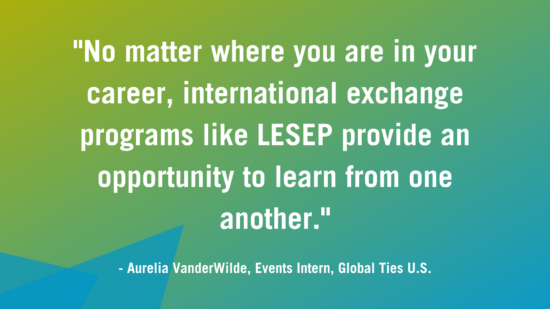By Aurelia VanderWilde, Events Intern, Global Ties U.S.
 When most people think about cultural exchanges, they likely think of studying abroad in college or hosting a high school exchange student – at least, that’s how it had been for me. It wasn’t until I started my internship with Global Ties U.S. that I learned of the many other exchange opportunities available, including those for career professionals. One that particularly caught my interest is the Law Enforcement Security Exchange Program (LESEP). LESEP is a professional exchange program funded by the U.S. Department of State’s Bureau of International Narcotics and Law Enforcement at Embassy Mexico City and facilitated by Global Ties U.S. LESEP brings together law enforcement officers from the United States and Mexico to promote professionalization in police personnel and institutions and address global challenges such as organized crime and citizen security.
When most people think about cultural exchanges, they likely think of studying abroad in college or hosting a high school exchange student – at least, that’s how it had been for me. It wasn’t until I started my internship with Global Ties U.S. that I learned of the many other exchange opportunities available, including those for career professionals. One that particularly caught my interest is the Law Enforcement Security Exchange Program (LESEP). LESEP is a professional exchange program funded by the U.S. Department of State’s Bureau of International Narcotics and Law Enforcement at Embassy Mexico City and facilitated by Global Ties U.S. LESEP brings together law enforcement officers from the United States and Mexico to promote professionalization in police personnel and institutions and address global challenges such as organized crime and citizen security.
I recently had the opportunity to attend a LESEP webinar with Global Ties U.S., where three female police officers from the United States sat down to share their experiences as women in law enforcement with their Mexican counterparts. The speakers discussed challenges they have faced throughout their careers, including a lack of female representation both in the police force as a whole and in leadership roles. This lack of representation is highlighted by the fact that women make up just 12.6% of law enforcement officers. I learned that LESEP specifically aims to address some of these representation issues by ensuring that half of the program participants are women, which can also help other female officers envision themselves in leadership positions.
The panelists shared three key components crucial to creating a more inclusive workforce: mentoring newer female officers, creating a more supportive environment for all officers, and ensuring that all personnel have a dedicated support system. As someone just starting on my own career path, I was especially inspired by the panelists’ viewpoints on the importance of having representation in the workforce and mentors available to reach out to and ask questions, which can inspire future female officers. You could tell that the message resonated with webinar participants as well.
The panelists noted that in such a demanding field finding a balance between work and family is often a challenge. One officer mentioned how she waited until after her kids were out of the house before getting her master’s degree. Another shared that her key to finding work-life balance is to always be clear when communicating with her family on nights she must work late, as well as setting boundaries about leaving work at work. The panelists urged the group to remember that there will always be trade-offs and while we cannot change the number of hours in a day, we can choose what is important to us and how to spend these hours. This piece of advice put things in a new light for me as I start my own path in my career and find my own work-life balance.
No matter where you are in your career, international exchange programs like LESEP provide an opportunity to learn from one another. As an attendee, I learned so much and was thankful to have the opportunity to participate in the webinar. I have experienced the impact of exchanges personally and know that public diplomacy through exchanges can be one of the most effective ways to promote cross-cultural understanding, bridge barriers, and connect communities.
